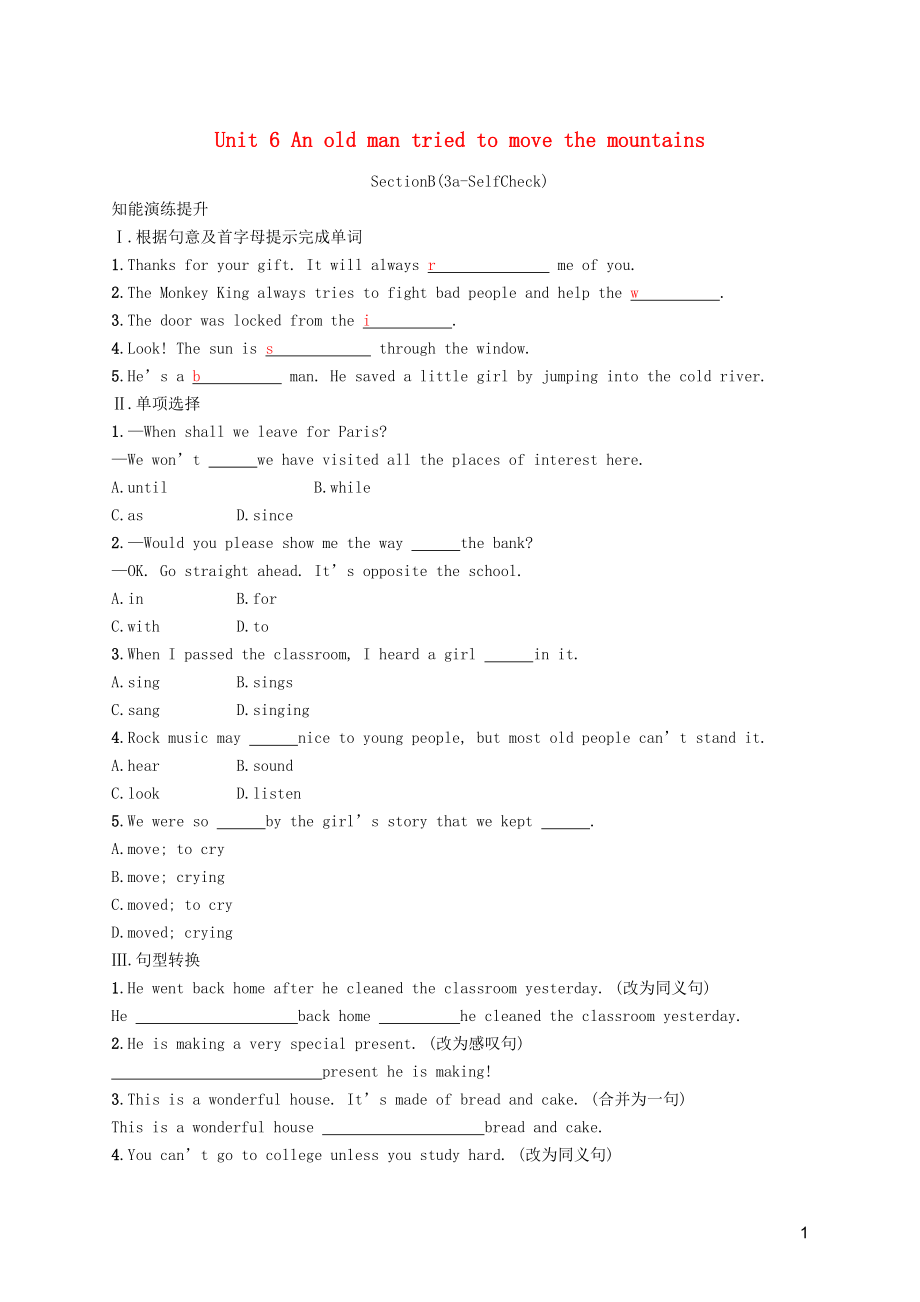《2019年春八年級(jí)英語(yǔ)下冊(cè) Unit 6 An old man tried to move the mountains(第5課時(shí))Section B(3a-Self Check)知能演練提升 (新版)人教新目標(biāo)版》由會(huì)員分享�,可在線閱讀��,更多相關(guān)《2019年春八年級(jí)英語(yǔ)下冊(cè) Unit 6 An old man tried to move the mountains(第5課時(shí))Section B(3a-Self Check)知能演練提升 (新版)人教新目標(biāo)版(3頁(yè)珍藏版)》請(qǐng)?jiān)谘b配圖網(wǎng)上搜索。
1�、Unit 6 An old man tried to move the mountains
SectionB(3a-SelfCheck)
知能演練提升
Ⅰ.根據(jù)句意及首字母提示完成單詞
1.Thanks for your gift. It will always r me of you.?
2.The Monkey King always tries to fight bad people and help the w .?
3.The door was locked from the i .?
4.Look! The sun is s
2、through the window.?
5.He’s a b man. He saved a little girl by jumping into the cold river.?
Ⅱ.單項(xiàng)選擇
1.—When shall we leave for Paris?
—We won’t we have visited all the places of interest here.?
A.until B.while
C.as D.since
2.—Would you please show me the way the bank? ?
—
3����、OK. Go straight ahead. It’s opposite the school.
A.in B.for
C.with D.to
3.When I passed the classroom, I heard a girl in it.?
A.sing B.sings
C.sang D.singing
4.Rock music may nice to young people, but most old people can’t stand it.?
A.hear B.sound
C.look D.listen
5.We were so by t
4、he girl’s story that we kept .?
A.move; to cry
B.move; crying
C.moved; to cry
D.moved; crying
Ⅲ.句型轉(zhuǎn)換
1.He went back home after he cleaned the classroom yesterday. (改為同義句)
He back home he cleaned the classroom yesterday.?
2.He is making a very special present. (改為感嘆句)
5����、 present he is making! ?
3.This is a wonderful house. It’s made of bread and cake. (合并為一句)
This is a wonderful house bread and cake.?
4.You can’t go to college unless you study hard. (改為同義句)
You can’t go to college you study hard.?
5.The man is very weak. He can’t car
6、ry the heavy bag. (合并為一句)
The man is weak he can’t carry the heavy bag.?
★Ⅳ.閱讀理解
Aesop was a slave who lived in Greece over 2, 500 years ago. We know very little about his life, but he is famous for his short, simple stories, called fables. Today there are many stories called Aesop’sFab
7���、les, but Aesop probably did not tell all of them. However, all of the fables are similar; they are short and simple and teach a lesson. These little stories are popular with the young and the old because they usually use very common things to teach deep truths. Here is one of Aesop’s less well-known
8�����、 fables.
Long ago, the mice’s losses(損失) to the cat were so great that they finally held a meeting to decide what to do. Some had one idea, some another, but finally a young mouse jumped up and said,“Unless we can see or hear the cat, we will die. We must find a way for her to make noise whenever s
9���、he is near. Therefore, I suggest(建議) that we find some string(線) and a small bell, and put it around the cat’s neck. Then as soon as we hear the bell, we can run to safety.”
All the mice thought this was a wonderful idea, until an old mouse stood up and said,“That is truly a good plan, but who is g
10、oing to put the bell on the cat?”Everyone was silent, and then the old mouse continued,“It is very easy to suggest impossible solutions.”
1.Which of the following statements is NOT TRUE?
A.Aesop was born more than 2, 500 years ago.
B.Aesop wrote a book called Aesop’sFables.
C.Both the young and
11�����、 the old love Aesop’s stories.
D.Aesop’s stories are short and simple and teach a lesson.
2.According to the author, why are Aesop’s stories so popular?
A.Because they are easy to read.
B.Because they are stories about common things.
C.Because the stories are about life long ago.
D.Because th
12�����、ey teach people truths about life.
3.What did the young mouse suggest?
A.Putting some string around the cat’s legs.
B.Putting a bell and some string around the cat’s neck.
C.Running to safety.
D.Making noise.
4.What was the problem with the young mouse’s idea?
A.No one could find any string
13����、.
B.No one could find a bell.
C.No one could put the bell on the cat.
D.No one agreed with the idea.
5.What does the underlined word “solutions” mean?
A.關(guān)鍵 B.辦法
C.實(shí)驗(yàn) D.問(wèn)題
參考答案
Ⅰ.1.remind 2.weak 3.inside 4.shining 5.brave
Ⅱ.1.A 2.D 3.D 4.B 5.D
Ⅲ.1.didn’t go; until 2.What a special 3.made of
4.if; don’t 5.so; that
Ⅳ.1.B 2.D 3.B 4.C 5.B
3
 2019年春八年級(jí)英語(yǔ)下冊(cè) Unit 6 An old man tried to move the mountains(第5課時(shí))Section B(3a-Self Check)知能演練提升 (新版)人教新目標(biāo)版
2019年春八年級(jí)英語(yǔ)下冊(cè) Unit 6 An old man tried to move the mountains(第5課時(shí))Section B(3a-Self Check)知能演練提升 (新版)人教新目標(biāo)版

